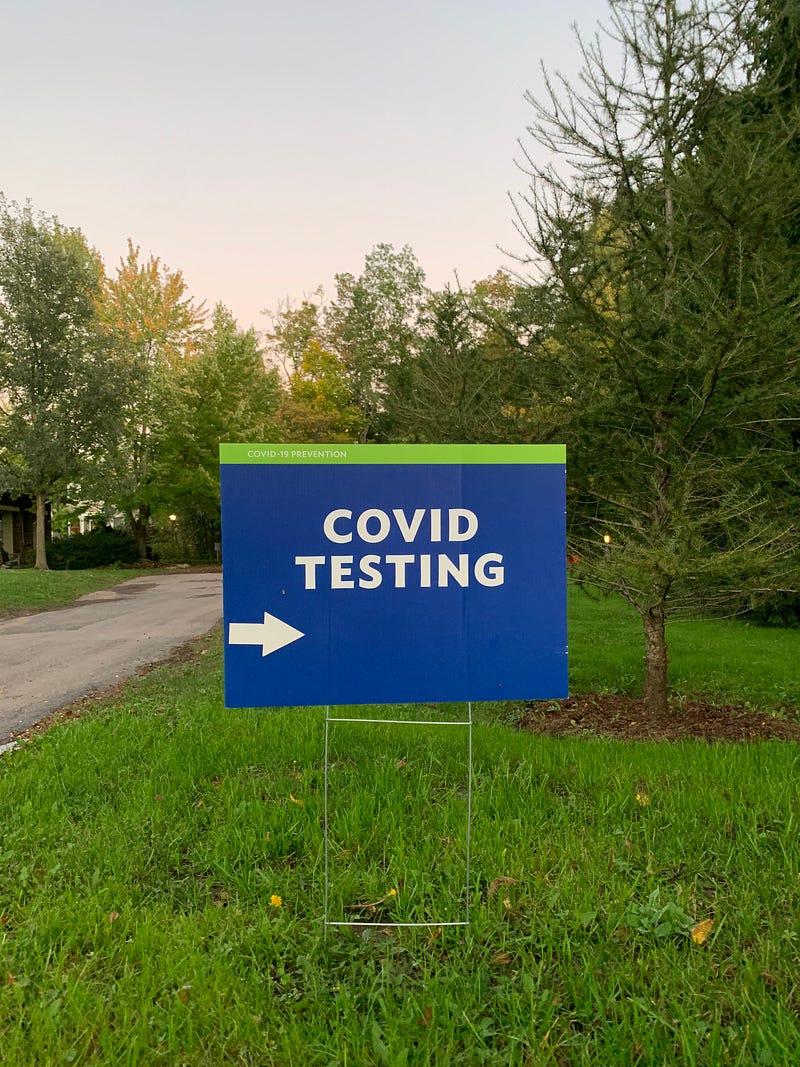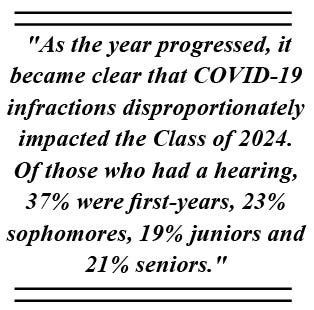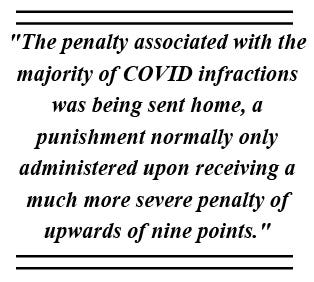
On Oct. 2, 2020, James Gallagher ’24 was walking back to his room in North Hall when he saw a small group of maskless first-year students gathering outside Commons. He approached the group, and almost immediately, two Campus Safety cars arrived at the scene. As everyone else ran at first sight of Campus Safety, Gallagher remained to comply with the officers. Gallagher gave the officers his Hill Card and thought nothing more of the incident.
Almost four weeks later, Gallagher received a text alleging that he violated the COVID-19 Community Agreement. An email contained dash-cam footage of his interaction with the Campus Safety officer and a video taken from the Commons security camera that zoomed in on Gallagher from 30 yards away, showing his mask on his chin for 57 seconds before placing it back over his face.
“I didn’t even know the camera was there,” Gallagher said. “The fact that they reviewed security footage, which is meant for a lot more severe things, to jeopardize my enrollment in the semester, was pretty intense.”
The hearing, which lasted only around fifteen minutes, found Gallagher responsible for breaking the COVID-19 agreement. “It was a pretty cut and dry case for them,” Gallagher said.
This situation was far too familiar for Hamilton students on-campus during the 2020–2021 academic year.
Over the 2020–21 academic year, 422 students were found responsible for breaking the COVID-19 Community Standards Agreement, representing almost a quarter of the student body, with most infractions resulting from a missed COVID test. Additionally, 56 students were removed from campus and forced to attend classes remotely. Of those found responsible for breaching the agreement, nearly 40% were first-years, 65 more students than the next leading class, and 70% identified as male.
The COVID-19 Task Force (specifically the Conduct and Discipline subcommittee) established the new disciplinary practices for the school year in summer 2020, electing to create a new system for COVID-19 related infractions. This new system included Administrative hearings conducted by hearing officers, and a two-step process for infractions. A student’s first offense would result in an official warning and parental notification, whereas a second infraction, according to the community agreement, would “result in termination of campus access for the remainder of the semester and removal from campus.” Students removed from campus would be forced to leave within 24 hours and would not receive any housing refund. According to Assistant Dean of Students for Student Engagement Travis Hill, drafting this policy “was very hectic […] we really didn’t know what to expect. We made a lot of plans that made sense and fit within the guidelines and the rules,” said Hill.

The administration fought against the characterization of a “two-strike policy,” a phrase that became popular among students. “There is not a two-strike policy,” said Director of Campus Safety Frank Coots. Similarly, Hill stated, “we try to push back against that phrasing […] one could have such a severe violation on the first instance that you don’t get another opportunity. There are also circumstances where students get more than two opportunities to violate a policy and stay on campus.” While protocols were put in place to keep the Hamilton community safe, students, particularly first-years, faced a balance between the excitement of a new college year and the stress of strict disciplinary practices that could result in a student being kicked off campus in a worst-case scenario. As the year progressed, it became clear that COVID-19 infractions disproportionately impacted the Class of 2024. Of those who had a hearing, 37% were first-years, 23% sophomores, 19% juniors and 21% seniors.
After his hearing, Gallagher expressed that the remainder of the academic year felt dramatically different than it had prior to his experience going through the disciplinary process. “It changed the way I relaxed […] any similar incident could remove me from Hamilton for the semester,” said Gallagher. As a member of the track and cross country teams, he held additional concerns, explaining “if I was seen within six feet of somebody on a run, I could get kicked out of the school.”
For some first-years, this balance was overwhelming. Anders Baum ’24 was excited to begin his college and athletic career by being on-campus and attending in-person classes. However, by the end of the first semester, he decided to finish the academic year at home, as the constant uncertainty and fear of punishment were too much for him. “By choosing to leave early, I definitely felt like I was missing out on new experiences and social connections that come with being a freshman at Hamilton,” said Baum.
Baum and Gallagher were not the only students who experienced constant fear of the disciplinary process. Friends and classmates of both of the authors explicitly expressed fear of the disciplinary process in conversations with the authors throughout the 2020–2021 academic year.
“To think that you guys were in fear really bothers me […] it’s unfortunate,” said Coots. “That was not the intent.”
Campus Safety’s role dramatically changed at the beginning of the 2020–21 academic year, as they were now responsible for enforcing COVID-19 violations in addition to their regular responsibilities. While the COVID-19 Task Force did not intend for this change going into the year, Coots credits their modified role to the fact that “after 5:00 p.m., there are not a lot of adults on campus. So a lot of [responsibilities] fell to Campus Safety.” Additionally, according to Coots, the Campus Safety office operates on a purely reactionary basis, meaning officers only report to a scene when they are called to do so. In the Fall 2020 semester alone, the office received almost 400 calls from students and faculty, which Coots explained to be an overwhelming amount.
Acting COVID-19 Task Force Chair Karen Leach expressed that while not perfect, the rules’ rigidity was necessary. Leach acknowledged, “I consider any student going home to be a really unfortunate circumstance, but I don’t know how we would change it.” Leach felt that in setting policies “the hardest [part] was the decision making with imperfect information.” Leach expressed that the Oneida County COVID-19 infection rate was constantly evolving and remained naturally unpredictable. However, as a result, students were subject to a system of absolutes carved out of “imperfect information.”
Leach noted, “we [the Task Force] put rules in place because we think it was the best judgment about how to help the community stay safe […] and then people make decisions that are unfortunate.”
Travis Hill has held a disciplinary role at the college throughout his committed 18 year tenure. However, during the 2020–2021 school year, he saw his role change. Taking an active role in conducting COVID-19 related student hearings, Hill described himself as having been “essentially the prosecutor on the part of the College.”
In retrospect, Hill thought that “the first semester [Fall 2020] was just particularly harsher than the second semester.” In the Spring 2021 semester, only nine students were removed from campus, a near 80 percent difference from the 47 students sent home in the fall. This change was due in part to the loosening of certain COVID-19 restrictions, such as being allowed in other dorms. Hill also accredited this dramatic drop to an adapted approach to the disciplinary process. “What I feel like happened, which is not typical, is that we really looked at our policies mid year, which we try not to do,” Hill stated.
Hill explained that during the Spring 2021 semester, administrators overseeing the hearing process “were given permission to put context into consideration based on how things shifted between semesters […] because in the first semester, there really wasn’t much discretion, and therefore not a lot of room for context.” However, the consequences of this strategy resulted in severe inconsistencies among punishments administered for different students accused of the same infraction across the two semesters.
Current infractions under the Hamilton College Fall 2021 COVID-19 policy operate under the standard disciplinary point system. A first-time COVID offense will be met with two disciplinary points, and a second-time offense will be given three points.

Therefore, a first-time COVID infraction is now the numerical equivalent of being caught with an open container (alcoholic beverage) or first-time marijuana use, behavior that is universally expected of college students. In the academic year 2020–21, the penalty associated with the majority of COVID infractions was being sent home, a punishment normally only administered upon receiving a much more severe penalty of upwards of nine points.
Hill reflected on last academic year that he was very impressed by students’ ability to adapt to a new normal. When commenting on the formulation of the COVID disciplinary practices from last year, Hill noted, “Speaking for myself, I thought, knowing how college students are and having worked with college students for many, many years, people complying to such rules seemed highly unlikely.”
Given that the perception regarding COVID-19 disciplinary practices from the outset was that they could be expected to be administered as frequently as perhaps penalties for alcohol use, what explains the college’s ease in mass-administering a penalty normally befitting an extreme, nine point offense? According to Hill, “knowing that you could stay on track academically [through remote instruction], even though it certainly would have an effect on your experience academically, made it to me seem like less of a consequence.”
In offering the option of remote learning, the College acted as though they were assigning a lower penalty. However, a spring 2021
Spectator
investigation found that students who studied remotely during the 2020–21 school year had lower GPAs and fewer credit hours than their in-person counterparts. Remote students also reported facing difficulties hearing, focusing or interacting with fellow students in hybrid classes and academic accommodations were offered only on a case by case basis. In an extended effort to put into place COVID protection protocols in the Spring semester, the College changed the weekly testing amount for students from twice a week to three times a week. This provided the campus with a constant flow of test results, but it also provided students with an extra opportunity to receive the dreaded text or email informing them that they had been reported to the Community Standards Office for a missed test.
Kate Bondarenko ’24, an international student from Russia, missed a COVID-19 test last academic year. As she was new to campus, she expressed, “I didn’t even think it was a big deal.” Given the many obstacles Bondarenko faced in acquiring a visa during the pandemic, the potential of being sent home was “really scary,” and “very stressful,” she stated. Coots offered a more optimistic take on how he thought a missed test situation would unfold in a hearing. Coots believed that in a COVID hearing, “everything is taken into its own merits, all the facts are judged.” However, this reveals a potential misunderstanding between the head of Campus Safety, the enforcers of the rules, and administrative hearing officers who held a different view. As Hill explained, “things like a missed test are pretty straightforward […] there’s not really a lot of opportunity to express a lot of context[…] you missed the test or you didn’t.”
However, some students were not afforded the opportunity of a hearing. Rebecca Mathews, a visiting international student from Scotland, missed a test early in her time at Hamilton. Instead of a notice for a scheduled hearing, Matthews received a letter stating, “due to the nature of the violation and the clarity of the incident it may not be necessary to hold a hearing. As a result, I am issuing you a COVID Warning.” It was a closed case.
Throughout all of last year, the College focused on ensuring student health and well-being. However, in practice, students expressed that this approach dramatically altered the Hamilton student experience in ways that they did not anticipate. While the College largely succeeded in maintaining low levels of COVID-19, the praise the College received does not factor into account the on-campus experience. For many, there were severe costs associated with the policies of last year, as they created unhealthy relationships, fostered hostile environments and left students constantly looking over their shoulders. One consequence was the exacerbation of tension between students and Campus Safety officers, as Coots acknowledged that “it’s been dramatically different, the lack of respect that some students have displayed when it comes to Campus Safety.”
Another consequence was a fear of participating in-person for academics, extracurriculars and social activities. Former COVID-19 Task Force Student Representative Eric Cortes-Kopp ’22 asked of himself “why am I even here?” when considering his inability to see close friends or attend all in-person classes without fearing disciplinary consequences.
As Coots said of students, “I think it’s never healthy to live in fear.”
















